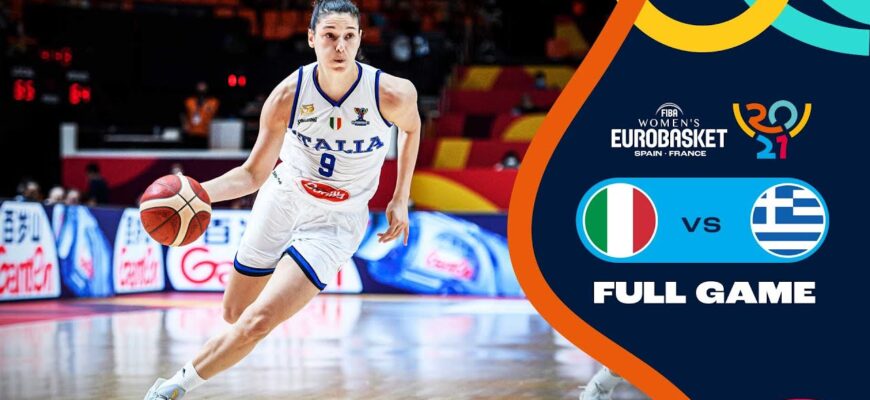The cacophony of international basketball friendlies often serves as more than just a pre-tournament warm-up; they are diagnostic sessions, revealing both inherent strengths and glaring vulnerabilities. For the Italian national team, the Azzurri, their recent performance at the Acropolis Tournament against Greece was precisely that: a stark, yet instructive, dress rehearsal for the upcoming EuroBasket. Ending in a narrow 76-74 defeat, this match wasn`t merely another notch in the loss column; it was a narrative woven with moments of brilliance, perplexing lapses, and a revealing glimpse into their tournament readiness.
A Familiar Foe, A Familiar Feeling
In what felt like a preview of their EuroBasket debut in Cyprus, Italy once again faced Greece. And once again, the outcome left a bittersweet taste. Following a preceding loss to Latvia, this second consecutive defeat underscored the challenges currently facing Coach Gianmarco Pozzecco`s squad. While the final buzzer indicated a mere two-point deficit, the journey to that score was a rollercoaster of dominant phases and disconcerting stumbles, highlighting both the Azzurri`s inherent character and the critical areas ripe for refinement. It`s the kind of “friendly” reminder no team truly relishes, but perhaps one that`s genuinely needed.
The First Half Flourish: A Glimmer of Italian Might
Italy started the game with an encouraging vigor that sharply contrasted with their previous outing. Early static attacks quickly gave way to dynamic play, punctuated by critical three-pointers from the versatile Simone Fontecchio. The initial 6-3 lead expanded as Nicolo Melli showcased his perimeter prowess, pushing Italy to an 11-5 advantage. Despite attempts by the Antetokounmpo brothers to rally Greece, Italy maintained its composure, ending the first quarter up 20-16.
The momentum carried into the second quarter, fueled by the electrifying energy of Mouhamet Diouf Niang – a player whose physical presence and relentless drive are quickly becoming indispensable for the Azzurri. Akele`s defensive blocks and subsequent three-pointer further extended Italy`s lead, even as Greece, spurred by Kalaitzakis and Toliopoulos, mounted a mini-comeback to narrow the gap to a single point (28-27). Yet, Italy responded with precision: Akele`s hook shot, Fontecchio`s accurate free throws, and Melli`s transition play culminated in a commanding 40-30 lead at halftime. The improved three-point efficiency (12/26 for the game) suggested a team finding its rhythm from beyond the arc, a welcome sight after previous struggles.

The Third Quarter Collapse: Where Fortunes Flipped
The second half, however, painted a starkly different picture. The aggressive energy expended in the first half began to take its toll, manifesting in what could only be described as a masterclass in `how not to sustain momentum`. Italy`s offense faltered, and a perplexing 18 turnovers throughout the game provided Greece with ample opportunities to capitalize on unforced errors.
Greece, sensing a palpable shift in momentum, launched a relentless assault. A swift 13-4 run quickly brought them back into contention (48-43), and Katsivelis`s timely 2+1 play further chipped away at Italy`s lead. Then, Dorsey delivered a decisive blow with a three-pointer that put Greece ahead 48-51, flipping the script entirely. Kalaitzakis joined the scoring spree from beyond the arc, extending the lead to seven (50-57) as Italy`s attack sputtered, marred by miscommunication and more turnovers. Only a powerful dunk from Niang offered a brief respite, but the quarter ended with Italy trailing 52-57, leaving them to chase the game in the final period.
Coach Pozzecco`s Conundrum: The Road Ahead
While Italy showed commendable fighting spirit in the fourth quarter – highlighted by Stefano Spissu`s crucial back-to-back threes and free throws that narrowed the gap to two points (71-73 with 1:30 left) – the late-game execution proved fatal. Melli`s potential go-ahead three-pointer rimmed out, and a series of missed opportunities and turnovers in the crucial final possessions allowed Greece to seal the victory from the free-throw line. Fontecchio`s last-second three-pointer was, tragically, a moment too late to alter the outcome.
For Coach Pozzecco, these two friendly losses serve as a valuable, if painful, diagnostic. The team`s reliance on specific offensive schemes requiring high energy, the excessive turnovers, and the need to find consistent form for players like Danilo Gallinari (who remained out by choice, adding another layer to the strategic puzzle) present a clear roadmap for improvement. The resilience demonstrated in the face of adversity is undoubtedly a positive, a testament to the team`s character. Yet, character alone won`t secure a EuroBasket title. Pozzecco faces the unenviable task of fine-tuning the squad, making difficult roster choices, and ensuring that the lessons learned from these “friendly” encounters are thoroughly integrated before the real competition begins.
Beyond the Scoreboard: A Test of Character
The Acropolis Tournament may have delivered two defeats for the Azzurri, but it also offered invaluable insights. The strong starts, the improved three-point shooting, and the undeniable fight demonstrated that Italy possesses the raw talent and spirit to compete at a high level. However, the lapses in concentration, particularly the dramatic third-quarter slump and the propensity for turnovers, are glaring vulnerabilities that international opponents will exploit mercilessly on a larger stage.
As Italy looks forward to a quick rematch with Greece in their EuroBasket opener, these friendly losses are less about the final score and more about the collective growth. The path to European glory is rarely smooth, and perhaps a few early stumbles are precisely the wake-up call the Azzurri need to truly galvanize their efforts. The character is demonstrably there; now it`s about channeling it into sustained, disciplined performance. The real test, after all, is just around the corner, and Italy`s basketball narrative is far from over.







